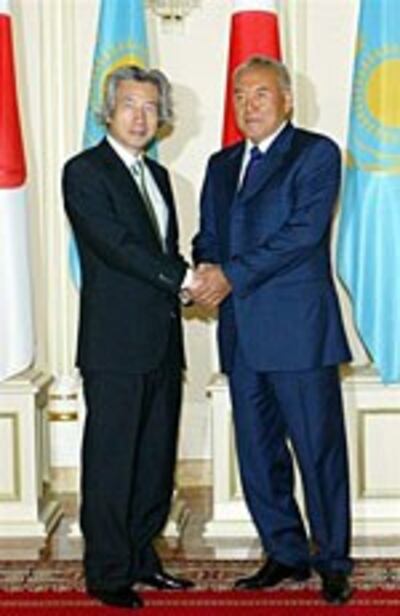
Japanese Prime Minister Junichiro Koizumi’s recent visit to Central Asia has drawn a sharp reaction from China, raising the risk that the region may become a new arena for friction between the two rival powers.
On Aug. 29, the English online edition of People's Daily published a commentary titled "What is Koizumi's Aim in Visiting Kazakhstan and Uzbekistan?" The prime minister, who will step down in late September, toured the two countries for the first time on Aug. 28-31.
Reports from the region suggest that Koizumi was well-received.
The commentary in China’s official Communist Party newspaper said Japan relies heavily on the Middle East for imported oil, making new sources of supply a priority.
What is Koizumi’s Aim in Visiting Kazakhstan and Uzbekistan?
People's Daily
Japan is also looking toward the large uranium resources in the two countries, People's Daily said.
But the paper also pointed to an alleged ulterior motive, saying, “Containing China and Russia, both of which have good relations with Kazakhstan and Uzbekistan, is Koizumi’s other aim for the visit.”
People's Daily noted that both Kazakhstan and Uzbekistan belong to the Shanghai Cooperation Organization (SC0), a six-member security grouping that also includes China, Russia, Kyrgyzstan, and Tajikistan.
A new sign of tensions?
The paper added that Tokyo had hosted a foreign ministers’ meeting in June to coincide with an SCO summit held in Shanghai.
Tokyo's purpose, People's Daily said, was "to show its defiance of Russia and China."
In interviews with Radio Free Asia, experts said China’s complaints reflect increased tensions with Japan over issues ranging from historical grievances over World War II to border and resource disputes in the East China Sea.
S. Frederick Starr, chairman of the Central Asia-Caucasus Institute at the Washington-based Johns Hopkins University’s Nitze School of Advanced International Studies, said China believes Japan, because of its initiatives in the region, is now trespassing in a Chinese sphere of influence.
“The view of the Central Asian governments themselves [though] is that the Shanghai Cooperation Organization supposedly pursues universal ends of free trade, anti-terrorism, and so forth,” Starr said.
“These are not exclusively Chinese ends. They’re not exclusively Russian ends. And I suspect that the Central Asians would look with caution at this kind of posture by China or by Russia.”
Starr noted that Japan has been more generous with aid and disaster relief in Central Asia over the last 15 years than either China or Russia.
In fact, Uzbekistan’s president Islam Karimov repeatedly thanked Koizumi during his recent visit for the $1.5 billion in aid that Japan has given Uzbekistan since it gained independence in 1991, according to Agence France-Presse.
Competition unlikely
Starr also said that Tokyo’s program of “Japan plus Central Asia” has been going on for years with meetings at the prime ministers’ level, so that Japan is hardly a newcomer to the region.
Starr said that these contacts have been “regularized, institutionalized.”
“And it’s quite inappropriate for China to adopt what to now has been a Russian position, namely, this is our private property.”
Mikkal Herberg, director of the Asian energy security program at the National Bureau of Asian Research in Seattle, said China appears to be overestimating Japan’s potential to compete with China for Central Asian energy resources.
While China’s plans for sourcing oil and gas in Central Asia have been criticized because of the vast distances and high transport costs involved, the distances for supplies to Japan are even greater, making competition unlikely, Herberg said.
But Herberg added that China is likely to see any move by Japan as a challenge.
“This is simply another arena in which China is frustrated with Japan. And it’s going to take its frustrations out in whatever Japan does, given the deteriorating relations between the two.”
The Central Asian nations are unlikely to be drawn into taking sides, Herberg said, noting that their leaders are “pretty sophisticated and pretty cognizant.”
“And what they’re trying to do, from my perspective generally, is fend off Russian control, fend off too much Chinese influence, fend off too much U.S. influence, but at the same time trying to extract the benefits that those relationships can bring.”
Original reporting by Michael Lelyveld. Edited for the Web by Richard Finney.
